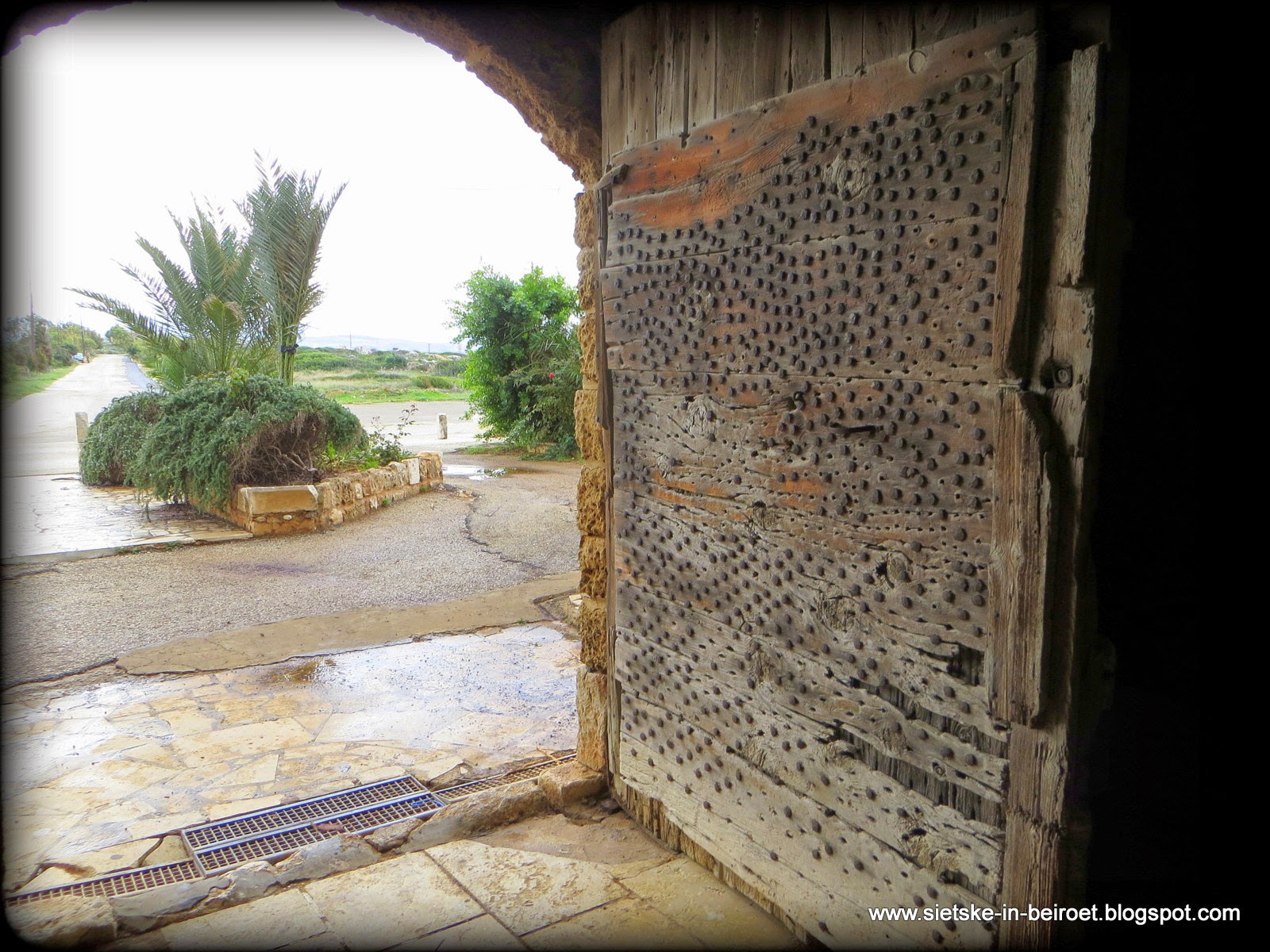 |
| Salt basins bordering the sea in Enfeh |
A little under Qalamoun (yes, we’re still up North with this story: Road Trippin' Part II) you find the salt basins of Enfeh. It is winter now, the slow season; salt is typically ‘farmed’ or harvested during the summer heat, but it is still a pretty interesting place to stop and check out.
The mining of salt through evaporation pools is a very old process; we were already doing it while still out there hunting and gathering our food, way back when. The process is simple; you fill a basin with a thin layer of sea water, let the sun evaporate the water, and you can shovel the mineral salt out. Salt, of course, brings out the flavor in food, or can help preserve it by drying it.
Salt was quite a commodity in the old days. In fact, ‘salary’ derives from the word salt. Apparently Roman soldiers were paid in salt; salt money, which translates into ‘salarium’.
I remember that some 20 years ago, you’d see basins all along the coast line in the north. The rising value of coastal properties, and the import of cheaper foreign salt have pretty much done in this ancient industry. The government didn’t help much either when they stopped taxing foreign salt imports. It is no longer a viable business, it seems. As a result, you do not see many salt basins that are still in working order. (Interesting article on it here).
'The Anfeh salinas alone represents half of Lebanese salt production, although its ancient methods really set it apart from the country's other salt beds, which employ more modern methods. Until 1990, Lebanon was self-sufficient in salt production, selling 45,000 tons a year locally. Because of government accords with other Arab countries, notably Egypt, Lebanon now produces only 20,000 tons annually.' (Source)
 |
| Shepherds graze their sheep on the upper part; These sheep dogs chase my car that has my sheep dog in it. |
I don’t quite get this part. If you’re self-sufficient at 45,000, how come now we end up with only 20,000 a year? If I were in the government, I’d tax foreign salt imports to the point where they become as expensive as local salt. Start with blocking Egyptian salt. Since salt isn’t all that healthy, taxing would give you a triple benefit. 1) you make money of taxing import, 2) local salt farmers will make a living, which brings money into the economy and 3) because salt become more expensive, people may use less of it, which should help in the costs of health care.
 |
| Deir Sayedet al-Natour, or 'Wife of the Janitor Monastery' (did I get the translation right here?) |
Besides, it’s interesting for tourist, who - I admit – do not show up anymore, but if ever we become a peaceful nation, a day at the salt basins could be an attraction. Add some B&B’s, organize workshops on ‘Salt Harvesting’ and ‘Lebanese Kitchen with Sea Salt’ , and voila, you got yourself package deal.
 |
| Door of the monastery |
Another odd thing (I think) is that the church finds little value in maintaining them as well. Many of the salt basins near Enfeh belong to the Greek Orthodox Monastery, Deir Sayedet al-Natour, but their salt basins have been pretty much abandoned. Just a few at the lower part of the hill are still functioning. They sell little bags of salt at 2,000 at the monastery entrance.
 |
| Salt for sale; 2,000 pounds a bag ($1.33) |
So it doesn’t make money anymore, but I would think that it is the responsibility of a religious order to not only provide spiritual guidance, but to help their people with work. Right now they lease the basins, but there are no takers. What if they would not ask for money, but lease the basins against maintenance costs only? This way the salt basins are maintained, a local industry is kept alive and people work and make some money. There’s got to be plenty of people there who need an income. So the church doesn’t get rich from it but I don’t think that’s their job description anyway.
In the West, you find all kinds of different salts , and exotic salts, in gourmet stores these days. Black salt from the Himalayas, coarse grey salt from Bretagne, pink salt from Thailand, and they sell at ridiculously high prices. 7 euros for a jar of Himalayan pink, I remember. Of course salt tastes like salt, although some may argue, but if packed nicely, it becomes a nice gimmick. Imagine, if you can market 3 exotic salts for $39.95, you won’t be able to market real Lebanese Sea Salt for $10 a jar?





5 comments:
Taxing imports supports inefficient local production. You're protecting your local economy with a dike. And then, one day... your dike will break. As a Dutch you surely understand this.
Y.
Excellent paper... as usual! I visited Anfeh last year and I'd love to return back to this spot I regretfully missed. :) May I suggest a slight correction? Saydet translates litterally into "Lady" not wife and I think the real meaning is the "Lady of guardian" meaning protection. Obviously the monastery got its name from the cape it was build upon.
I was in Guérande this summer. They sell Le fleur de sel, very expensive! But the taste is exelent, it taste a bit of algae... really nice but very expensive.... now im in Lebanon I'm gonna try the Enfe salt & compare.
La fleur de sel. 'sorry'
Food and Nutrition
Post a Comment